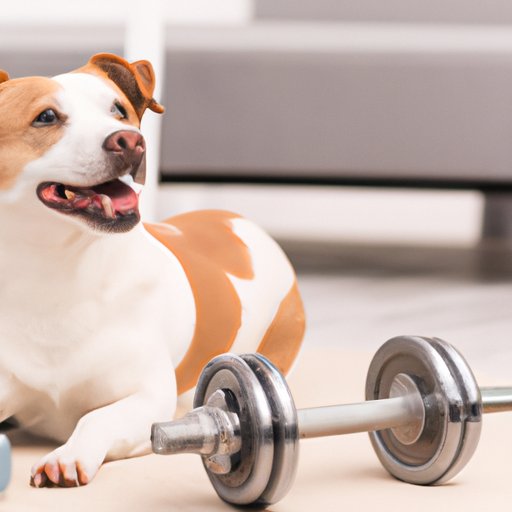
I. Introduction
Dog obesity is a growing problem, with many owners struggling to help their furry friends achieve a healthy weight. Not only can obesity lead to a range of health problems, but it can also impact a dog’s overall quality of life. In this article, we will explore several strategies for helping your dog lose weight in a safe and effective way.
II. Diet Control
One of the first steps in helping a dog lose weight is to ensure they are consuming a balanced diet. This means selecting dog food that is high in protein, but low in unhealthy fats and calories. Look for dog food brands that are free from fillers and use real meat as the primary ingredient. It’s important to also monitor the portion sizes, as feeding too much food – even if it’s healthy – can lead to weight gain.
Additionally, be mindful of any treats or table scraps that your dog may be consuming throughout the day. Try to limit these to a minimum, and opt for healthier options such as small pieces of fresh fruits or vegetables.
Regularly monitoring your dog’s weight is also crucial in correcting any overeating tendencies. Use regular weight checks and progress photographs to track their progress.
III. Exercise Routine
Incorporating a regular exercise routine is another key component of helping dogs achieve a healthy weight. However, it’s important to start slow and gradually increase activity levels to prevent injury or exhaustion. Initially, walking and playing with your dog for 30 minutes each day is a great way to help them lose weight. As they become more active, look for opportunities to incorporate more intense activities such as running, hiking, or swimming.
If your dog is initially lazy or inactive, try to make exercise more fun and enjoyable by engaging them in playful activities such as fetch, tug of war, or hide-and-seek. Taking your dog on regular outdoor walks and letting them explore new areas can also help encourage movement.
IV. Lifestyle Habits
Small changes to your dog’s daily routine can make a big difference in helping them lose weight. For example, providing healthy, low-calorie chew toys can help keep them occupied and satisfied between meals. Promoting better sleep habits can also help improve their overall wellness and ultimately, their weight. To help encourage sleep, create a comfy and quiet sleeping space for your dog.
V. Trick Training
Trick training can be a fun way to encourage dogs to move more. Training can be used to motivate and reward your dog for being active. Dogs love to show off their skills and make their owners happy, so giving them a job to do can be rewarding. Some great tricks that help promote physical activity include playing dead, rolling over, and jumping through hoops. Remember, training should be enjoyable for both you and your pup, so don’t get too frustrated if they don’t get it right away.
VI. Health Supplements
In addition to diet and exercise, there are a number of health supplements that can help support dogs in their weight loss journey. Supplements can promote metabolic health and support the immune system. Omega-3, which is found in fish oil, is a great supplement to give to dogs as it helps reduce inflammation, support healthy skin, and promotes overall health. Additionally, glucosamine, chondroitin, and MSM are supplements that help promote joint health and regular movement. Always consult your veterinarian before administering any health supplements to ensure the proper dosage.
VII. Regular Veterinary Visits
Regular vet check-ups are critical in monitoring progress and making any necessary adjustments in your dog’s weight loss plans. During routine visits, vets can assess your dog’s overall health and make recommendations based on their unique needs. They can also help set realistic weight loss goals and provide support throughout the process.
VIII. Conclusion
Helping your dog achieve a healthy weight is ultimately about creating a balanced and active lifestyle. Incorporating healthy habits into your dog’s daily routine can be fun for both you and your furry friend. By selecting healthy dog food, incorporating regular exercise, making lifestyle changes, incorporating tricks, and collaborating with your vet, it’s within reach to help your dog lose weight and achieve optimal health.
For More tips and tricks, please visit your veterinarian or check out online resources for guidance and support.




